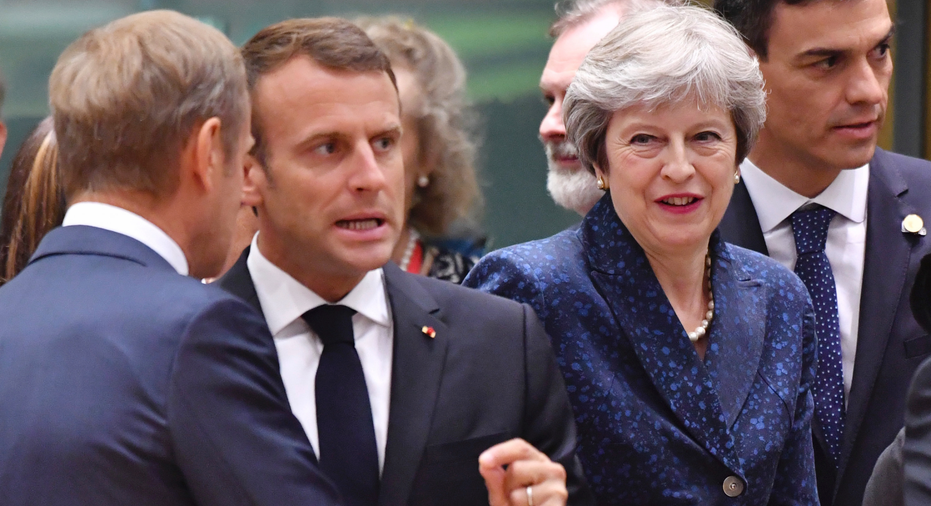May and EU urge Brexit haste, trade blame over stalemate

BRUSSELS – Britain and the European Union agreed Thursday that the faltering Brexit talks need to speed up, but traded blame at a Brussels summit for the failure to make progress in negotiating the U.K.'s departure from the bloc.
EU leaders said British government divisions were endangering a divorce deal, while Britain accused the EU of taking an inflexible attitude to security that could make Europeans less safe.
Britain's looming March exit was something of a side dish on the first day of an EU summit where the top priority was stemming a political crisis over migration that is shaking European unity and undermining German Chancellor Angela Merkel's government.
Prime Minister Theresa May was given a slot over dinner to update the 27 other EU leaders on U.K. departure plans. The other EU nations will assess progress in divorce negotiations without her on Friday.
Britain is frustrated by what it sees as the bloc's inflexible approach. EU leaders have warned, repeatedly, that Britain can't cherry-pick benefits of membership, such as access to the single market of 500 million consumers, without accepting the responsibilities that come with being in the bloc, including allowing free movement of EU citizens to the U.K.
The EU says Britain will be treated like any other third-party country after it leaves, but Britain wants special status in areas including security. The U.K. aims to retain a form of associate membership in bodies including the police agency Europol and the European Criminal Records Information System.
May's office said she told EU leaders at dinner that Britain plays a key role in European security, but "our ability to do so is being put at risk."
Britain argues that the existing rules for third-party countries would deny Britain access to key databases and make information-sharing more unwieldy. May said Britain wanted an "ambitious partnership" on security — an echo of her frequent calls for a "deep and special" trade partnership with the EU.
Security is just one of many issues that remain unresolved two years after Britain voted to leave the bloc. May's own Conservative government is very divided about how close a relationship to seek with the EU after Brexit.
The British leader is caught between pro-EU parliamentarians who want to retain close economic ties with Britain's biggest trading partner, and pro-Brexit lawmakers who want a clean break so Britain can strike new trade deals around the world.
European Commission President Jean-Claude Juncker said he was worried by the lack of progress.
"I don't have to lecture Theresa May, but I would like our British friends to make clear their positions," he said. "We cannot go on to live with a split Cabinet."
British divisions look set to come to a head next week, when May gathers her fractious Cabinet at Chequers, the prime minister's country retreat, to try to draw up a united plan for future trade and security ties with the EU.
EU officials have warned that the timetable the two sides have set themselves — to reach a divorce agreement by October so that EU national parliaments can ratify it before Britain officially leaves the bloc in March — is slipping out of reach.
"We did expect that we would make more progress — or any progress, really," Irish Prime Minister Leo Varadkar said. "What I will be saying to Prime Minister May is that we all have to intensify our efforts now. All of us want a deal."
EU leaders are especially keen to see progress on the issue of the Irish border. Britain has promised to maintain an invisible border, free of customs posts and other infrastructure, between Northern Ireland and the Republic of Ireland — the U.K.'s only land frontier with an EU member.
EU officials say they await detailed proposals from Britain for how that can be achieved, given May's insistence that Britain will leave the EU's customs union.
"I don't want to talk in apocalyptic terms," said Dutch Prime Minister Mark Rutte. "What I want to say is the first, second and third priority now is to solve the problem of the Irish border."
Varadkar said he looked forward to seeing the plan produced by the British government after next week's meeting — though, he added, it would have been better to have had that information two years ago.
"You would have thought that before people voted to leave the European Union they would have had an idea of what that new relationship would look like," he said.



















